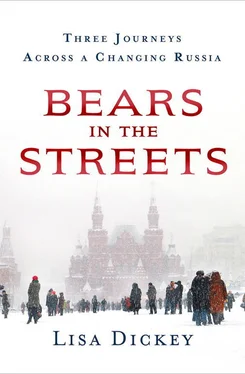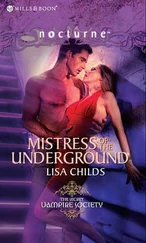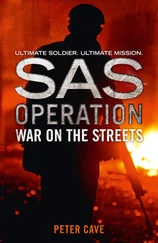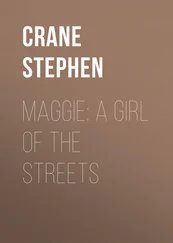There was no point in lugging the broken laptop all the way across Russia, so I decided to destroy it. One rarely gets such an opportunity, so I thought it would be fun to get creative—throw it off the top of a building, or toss it into the bay, or pour a cup of coffee over it, filming everything in slow motion. Back at my hotel room, I opened it up and pressed the “on” button. I wanted to photograph that infuriating flashing question mark for posterity before the orgy of destruction began.
Except… the laptop booted right up.
I sank onto the bed, dumbfounded. How could this be? I stared at the screen, then started clicking on documents and web pages. Yep, everything worked perfectly.
I never told Lusya; how could I? We went back to Anya i Dobrynya that night and toasted with that rocket-fuel Chinese vodka, and I just kept saying, “Thank you, thank you, thank you,” my gratitude mixed with a terrible twinge of guilt for what I’d put her through. [8] Later that night, still racked with guilt, I called an L.A. computer-guru friend to ask if I was a complete idiot. She said that even though my old laptop booted up, it was unstable and probably would have conked out again on the trip. I still felt dumb.
The next morning, Lusya, Valya, and Katya came to the train station to see me off, each bearing gifts: from Valya, a plastic container of home-picked plants for potpourri; from Katya, a giant 3-D refrigerator magnet with tigers, and a whistle made out of a conch shell (“in case a man tries to mess with you on the train”); and from Lusya, a plastic bottle filled with samogon . I hugged each of them, unable to believe it might be ten more years before we saw each other again. But the Great Laptop Debacle had put me behind schedule, so it was already past time to get to my next, very different destination: the “Jewish Homeland” of Birobidzhan.
THREE
Birobidzhan: Stalin’s Jewish Homeland
At one-thirty in the morning, 15 hours after leaving Vladivostok, my train pulled into Birobidzhan. Lugging my bags onto the platform, I looked up at the sight that had so surprised me back in 1995: on the station building, the word BIROBIDZHAN was written not only in Russian, but in Yiddish too.
I glanced for just a moment, as I was nervous to be arriving alone in the dead of night. Fortunately, a few other people had straggled off the train, so I followed them toward a parking lot where, to my relief, there were a couple of waiting taxis. I climbed into one and told the young driver, “Hotel Vostok.”
“You have a reservation there?” he asked, eyeing me in his rearview mirror. “That hotel is expensive.” And it was, in fact, one of the most expensive in Birobidzhan, at 1,250 rubles a night. Which, at the current exchange rate, was about 20 U.S. dollars. Which tells you everything you need know about how fancy the town is.
The boxy, six-story Vostok sits in the center of Birobidzhan, just a few blocks from the train station. I carried my bags up the front steps and into the lobby, and an older woman seated behind the front desk took my passport. Then she looked at her computer and said, “You booked your room for the twelfth. But today is the thirteenth.” She tsk-tsked , shaking her head. “You should have booked for the thirteenth, saved yourself some money.”
“But it’s two a.m. on the thirteenth,” I told her. “Check-in time is noon. I wouldn’t have wanted to wait that long to get into my room.”
“Oh, no,” she said. “We put people in rooms as they arrive. It’s the thirteenth today, so you should have booked for the thirteenth. Very simple. That’s your mistake.”
Now I was irritated, but it made no sense to argue. As she fiddled with papers behind the desk, I looked to the side and saw a freestanding rack labeled “Souvenir Shop.” The only items displayed were a dozen small, framed paintings of black-hatted Jewish men in various poses—carrying menorahs, playing poker, playing clarinet while floating in a flock of birds, staring a giant fish in the face. They were bizarre, bordering on anti-Semitic, and I wondered idly why the hotel didn’t just carry postcards instead. Then, the woman interrupted my reverie by asking how I wanted to pay for my room.
I handed her a credit card. “Ohhh,” she said, and pinched it between her forefinger and thumb as though handling a rare document. She fished around under the desk, pulled out a handheld credit card reader, and said, “I never do this. I hope I don’t mess it up.” She ran the card through the slot very, very slowly. Not surprisingly, it didn’t register. “You have to do it a little faster,” I told her. “Don’t be afraid.” She tried a couple more times, and finally the card registered.
She peered again at her computer. “It says to type in the last four numbers on the card,” she said. “And then press oak.” Press oak? She was speaking Russian, but she said this last word in English, like the tree. I leaned over the counter to look, and on her computer screen was a prompt with the word “OK.” This was becoming a very entertaining hotel check-in.
After some hesitation, the woman managed to type in the four numbers and press “oak.” Then she told me my room number and wished me a good night.
“And the key?” I asked.
“There’s a dezhurnaya upstairs,” she told me. A dezhurnaya ! In the Soviet era, hotels always had dezhurnayas—ladies stationed on each floor who kept the room keys and monitored comings and goings—but I hadn’t encountered such a system in years. Birobidzhan truly did seem to be stuck in a time warp, which was perhaps not surprising, considering the odd history of the place.
* * *
In the late 1920s, more than two decades before the State of Israel was established, Joseph Stalin decided to create a Jewish homeland in Russia. But not just anywhere in Russia: the government’s decree designated land “near the Amur River in the Far East”—a desolate, swampy outpost 4,000 miles away from Moscow. If the map of Russia were a dartboard with Moscow at the bull’s-eye, Birobidzhan, nestled above the northeast corner of China, would be the spot where a drunk guy accidentally chucked his dart into the wall.
To convince Jews to move there, the government offered free railroad passage, free meals along the way, and 600 rubles to each settler. Soviet propaganda organs produced pictures of smiling workers hauling grain and driving tractors, all of them tanned and happy under the perpetually sunny skies of Stalin’s promised land. Thousands of Jews took up the government’s offer, coming from not only Russia but all over the world—Argentina, the United States, even Palestine—to settle in the new Jewish region.
Some came to escape anti-Semitism. Many came because they had nothing, and therefore nothing to lose. And even more came in the early 1930s to escape starvation, as tens of thousands of Soviets began suffering and dying under Stalin’s brutal collectivization policies in Ukraine. As waves of migrants continued to flow here, the Soviet government in 1934 designated the area as the Jewish Autonomous Region, with Birobidzhan as its capital.
This sounded pretty, but the reality was less so. The defining characteristics of the Jewish Autonomous Region were freezing winters and blisteringly hot summers with clouds of ravenous mosquitoes. So, even though 41,000 Jews arrived during that first decade, 28,000 of them turned around and left by the end of 1938. Yet new migrants kept on coming, and by 1948 the region’s Jewish population had swelled to 30,000. Then came a sudden, brutal wave of anti-Jewish repression, as the Soviet government closed schools and synagogues, arrested writers, and drove Jewish cultural and religious life underground. From that point on, the Jewish population here began a slow decline.
Читать дальше












